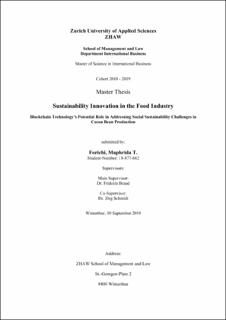Please use this identifier to cite or link to this item:
https://doi.org/10.21256/zhaw-19576Full metadata record
| DC Field | Value | Language |
|---|---|---|
| dc.contributor.advisor | Brand, Fridolin S. | - |
| dc.contributor.advisor | Schmidt, Jörg | - |
| dc.contributor.author | Forichi, Maphrida T. | - |
| dc.date.accessioned | 2020-02-28T15:03:51Z | - |
| dc.date.available | 2020-02-28T15:03:51Z | - |
| dc.date.issued | 2019 | - |
| dc.identifier.uri | https://digitalcollection.zhaw.ch/handle/11475/19576 | - |
| dc.description.abstract | That innovation is key for business has become a widely accepted notion. However, what is now considered the key driver for innovation is sustainability (Nidumolu, Prahalad, & Rangaswami, 2009, p. 3). Sustainability challenges are offering plenty of potential for innovation and business opportunities. Multinational companies are increasingly being held accountable for upstream supply chains, leading them to seek new ways to manage them and reduce liabilities (Tachizawa & Wong, 2014, p. 643). New social and environmental regulation and laws are increasing the pressure for innovativeness, and business opportunities are presenting themselves through the visions and ideas presented by sustainability (Hansen, Grosse-Dunker, & Reichwald, 2009, p. 684). Moreover, various empirical studies have identified sustainability’s positive correlation with business success (Wagner & Schaltegger, 2003). A rising demand for transparency and increasing consumer awareness of the conditions under which products are produced and raw materials are obtained has been observed since the early 2000s (Carter & Rogers, 2008, p. 366). While companies are looking to technological advances to do social good (Suyash, 2012, p. 122), there is increasing attention to the prospect of blockchain addressing sustainability in supply chains (Kamble, Gunasekaran, & Gawankar, 2019, p. 180). Blockchain is increasingly being hailed as a breakthrough technology that will improve transparency, transferability and accountability in value chains, which for companies in food value chains could imply improving sustainability standards (Pearson et al., 2019; Yiannas, 2018). Walmart and other big food companies are harnessing blockchain’s potential in their supply chains. | de_CH |
| dc.format.extent | 104 | de_CH |
| dc.language.iso | en | de_CH |
| dc.publisher | ZHAW Zürcher Hochschule für Angewandte Wissenschaften | de_CH |
| dc.rights | https://creativecommons.org/licenses/by-nc-nd/4.0/ | de_CH |
| dc.subject.ddc | 658: Allgemeines Management | de_CH |
| dc.title | Sustainability innovation in the food industry : blockchain technology’s potential role in addressing social sustainability challenges in cocoa bean production | de_CH |
| dc.type | Thesis: Master | de_CH |
| dcterms.type | Text | de_CH |
| zhaw.departement | School of Management and Law | de_CH |
| zhaw.publisher.place | Winterthur | de_CH |
| dc.identifier.doi | 10.21256/zhaw-19576 | - |
| zhaw.originated.zhaw | Yes | de_CH |
| Appears in collections: | MSc International Business | |
Files in This Item:
| File | Description | Size | Format | |
|---|---|---|---|---|
| Forichi Maphrida_MSc IB_Master Thesis_2019.pdf | 2.14 MB | Adobe PDF |  View/Open |
Show simple item record
Forichi, M. T. (2019). Sustainability innovation in the food industry : blockchain technology’s potential role in addressing social sustainability challenges in cocoa bean production [Master’s thesis, ZHAW Zürcher Hochschule für Angewandte Wissenschaften]. https://doi.org/10.21256/zhaw-19576
Forichi, M.T. (2019) Sustainability innovation in the food industry : blockchain technology’s potential role in addressing social sustainability challenges in cocoa bean production. Master’s thesis. ZHAW Zürcher Hochschule für Angewandte Wissenschaften. Available at: https://doi.org/10.21256/zhaw-19576.
M. T. Forichi, “Sustainability innovation in the food industry : blockchain technology’s potential role in addressing social sustainability challenges in cocoa bean production,” Master’s thesis, ZHAW Zürcher Hochschule für Angewandte Wissenschaften, Winterthur, 2019. doi: 10.21256/zhaw-19576.
FORICHI, Maphrida T., 2019. Sustainability innovation in the food industry : blockchain technology’s potential role in addressing social sustainability challenges in cocoa bean production. Master’s thesis. Winterthur: ZHAW Zürcher Hochschule für Angewandte Wissenschaften
Forichi, Maphrida T. 2019. “Sustainability Innovation in the Food Industry : Blockchain Technology’s Potential Role in Addressing Social Sustainability Challenges in Cocoa Bean Production.” Master’s thesis, Winterthur: ZHAW Zürcher Hochschule für Angewandte Wissenschaften. https://doi.org/10.21256/zhaw-19576.
Forichi, Maphrida T. Sustainability Innovation in the Food Industry : Blockchain Technology’s Potential Role in Addressing Social Sustainability Challenges in Cocoa Bean Production. ZHAW Zürcher Hochschule für Angewandte Wissenschaften, 2019, https://doi.org/10.21256/zhaw-19576.
Items in DSpace are protected by copyright, with all rights reserved, unless otherwise indicated.